22.08.22
The Australian Society of Authors (ASA) is delighted to announce the shortlist for the 2022 Barbara Jefferis Award: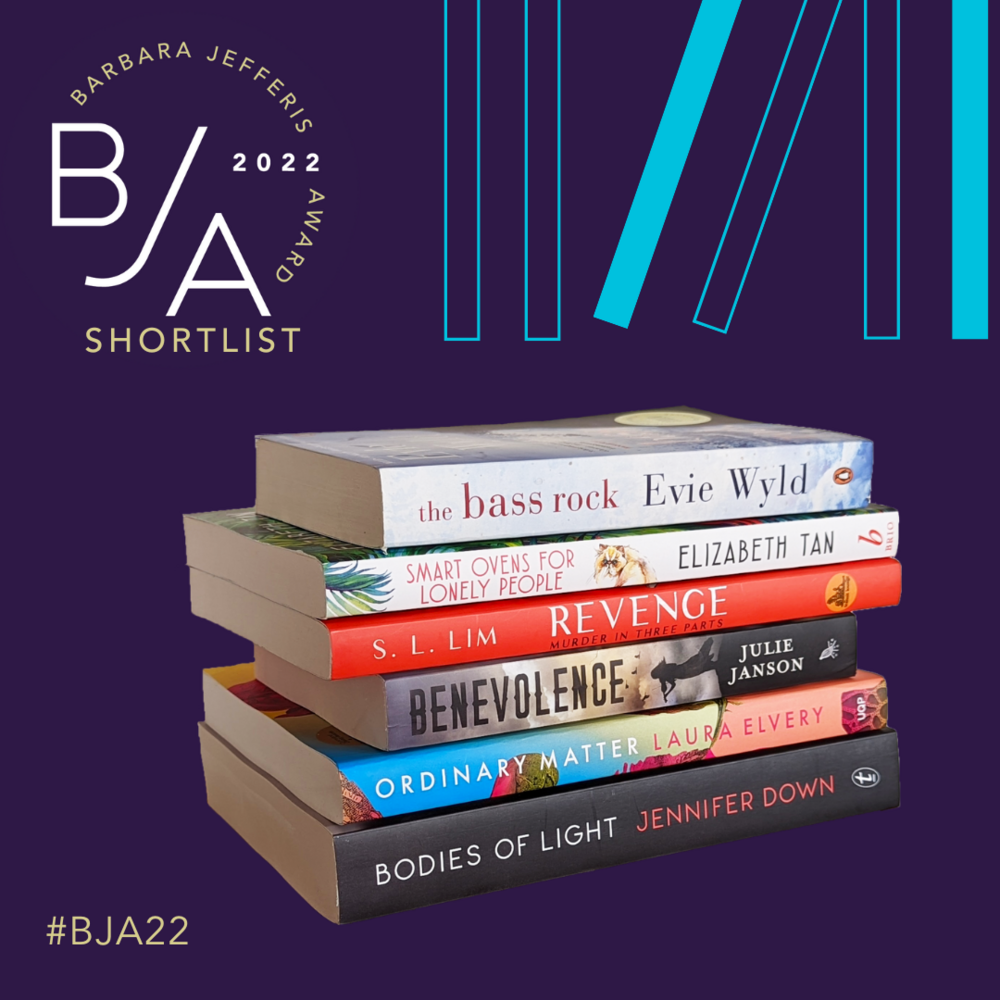
This year’s judging panel was chaired by internationally bestselling author Toni Jordan. Jordan was joined on the panel by writer, musician and former Barbara Jefferis Award winner Peggy Frew, and writer, poet and essayist Declan Fry.
The judges were impressed with the high quality of the work submitted to this year’s Award: “We were struck by the intersectional nature of gender as reflected in so many of the stories, and the way that race, class, sexuality, identity and culture were inseparable from the characters’ experiences. This year’s prize was also notable for the large number of very good short-story collections represented. We enjoyed reading them all, and four in particular were included in our final discussions.
“We were also pleased to find women and girls of all ages appearing in the entries, especially the number of excellent novels featuring girls as protagonists.
“Frequently we found that the shortlisted and highly commended works distinguished themselves by freshness of their perspective, the urgency of their theme and, in many cases, the extraordinary empathy the writers brought to the lives of their protagonists. We felt especially fortunate to read entries that were new to us, and feel privileged to bring attention to these wonderful books.
"In the end, nine books distinguished themselves throughout our process. Our discussions were long, involving and unanimous. We have included a ‘Highly Commended’ list to acknowledge both the tightness of our field, and also those writers whose wonderful work was the subject of our admiration.”
The highly commended titles include:
The judges also noted the scarcity of work submitted by authors who identify as men, “This might genuinely represent the number of Australian men writing novels in which women and girls are depicted positively, or merely be a reflection of their publishers’ judgement as to their likelihood of winning.”
ASA CEO, Olivia Lanchester says, “In the context of the recent spotlight on women’s issues, both in Australia and abroad, an Award which generates conversations about the way women and girls are represented in literature continues to be highly relevant and important. We are delighted to be able to administer this Award every two years, and offer our warmest congratulations to the shortlisted and highly commended authors.”
The winner of the 2022 Barbara Jefferis Award will be announced at a ceremony on Thursday 29 September 2022. The winner will receive $50,000, and $5,000 will be distributed amongst the shortlisted authors.
Bodies of Light by Jennifer Down (Text Publishing)
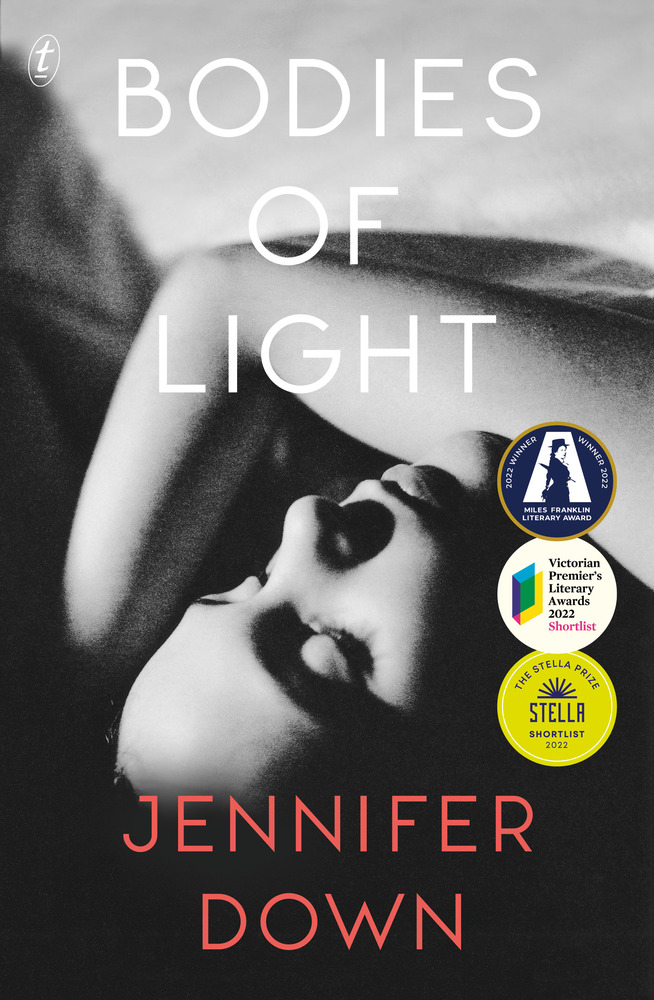 Bodies of Light is a virtuoso performance from Jennifer Down, showing a remarkable level of research, imagination, and art. We follow Maggie (also known as Holly) from early girlhood through to middle age through her liminal life, parentless, growing up in the system of state care. People come and go, as do homes – or perhaps just places of shelter. Again and again, Maggie is forced by new contexts to reinvent herself, and eventually a series of devastating events means she must make a complete break with her past. As a portrait of one woman’s very particular set of experiences, this novel is immersive and engaging. It also takes readers deep inside the world of patriarchal systems – child welfare, hospitals, police – and in doing so demonstrates the tremendous fortitude required of girls and women who seek to develop and maintain any sense of self therein. Lyrical, staggeringly rich in detail, moving and ambitious, Bodies of Light establishes Jennifer Down as one of Australia’s most important writers.
Bodies of Light is a virtuoso performance from Jennifer Down, showing a remarkable level of research, imagination, and art. We follow Maggie (also known as Holly) from early girlhood through to middle age through her liminal life, parentless, growing up in the system of state care. People come and go, as do homes – or perhaps just places of shelter. Again and again, Maggie is forced by new contexts to reinvent herself, and eventually a series of devastating events means she must make a complete break with her past. As a portrait of one woman’s very particular set of experiences, this novel is immersive and engaging. It also takes readers deep inside the world of patriarchal systems – child welfare, hospitals, police – and in doing so demonstrates the tremendous fortitude required of girls and women who seek to develop and maintain any sense of self therein. Lyrical, staggeringly rich in detail, moving and ambitious, Bodies of Light establishes Jennifer Down as one of Australia’s most important writers.
Ordinary Matter by Laura Elvery (University of Queensland Press)
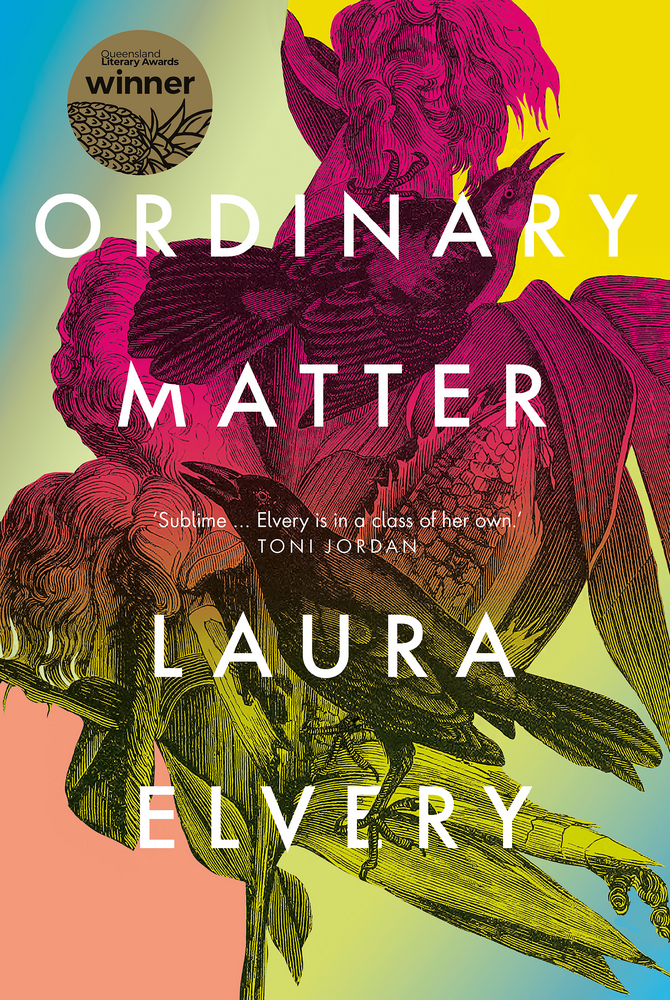 Elvery’s skill in short fiction finds full expression in Ordinary Matter: a collection of stories each inspired by a female scientist who has won the Nobel Prize. Some of the stories are realistic in style, like ‘Grand Canyon’, in which Elvery imagines Marie Curie and her daughters on tour in the United States, or ‘Stockholm’, which places Rosalyn Yalow the day before her prize ceremony in 1977. Other stories use the scientists as prompts for stories only tangentially connected to their lives, no less effectively. This is a book with a thesis: these remarkable women have each succeeded against impossible odds and should be remembered, Elvery is saying, and there are short biographies of each of them at the back. Ordinary Matter, though, is that rare work that carries its agenda lightly, and it is whimsical and witty as well as serious. In using the innovations of these scientists as a springboard for her own creativity, Elvery blurs the line between art and science, enhances the status of women in science and encourages her readers to discover some of our most important, yet unknown, feminist heroes.
Elvery’s skill in short fiction finds full expression in Ordinary Matter: a collection of stories each inspired by a female scientist who has won the Nobel Prize. Some of the stories are realistic in style, like ‘Grand Canyon’, in which Elvery imagines Marie Curie and her daughters on tour in the United States, or ‘Stockholm’, which places Rosalyn Yalow the day before her prize ceremony in 1977. Other stories use the scientists as prompts for stories only tangentially connected to their lives, no less effectively. This is a book with a thesis: these remarkable women have each succeeded against impossible odds and should be remembered, Elvery is saying, and there are short biographies of each of them at the back. Ordinary Matter, though, is that rare work that carries its agenda lightly, and it is whimsical and witty as well as serious. In using the innovations of these scientists as a springboard for her own creativity, Elvery blurs the line between art and science, enhances the status of women in science and encourages her readers to discover some of our most important, yet unknown, feminist heroes.
Benevolence by Julie Janson (Magabala Books)
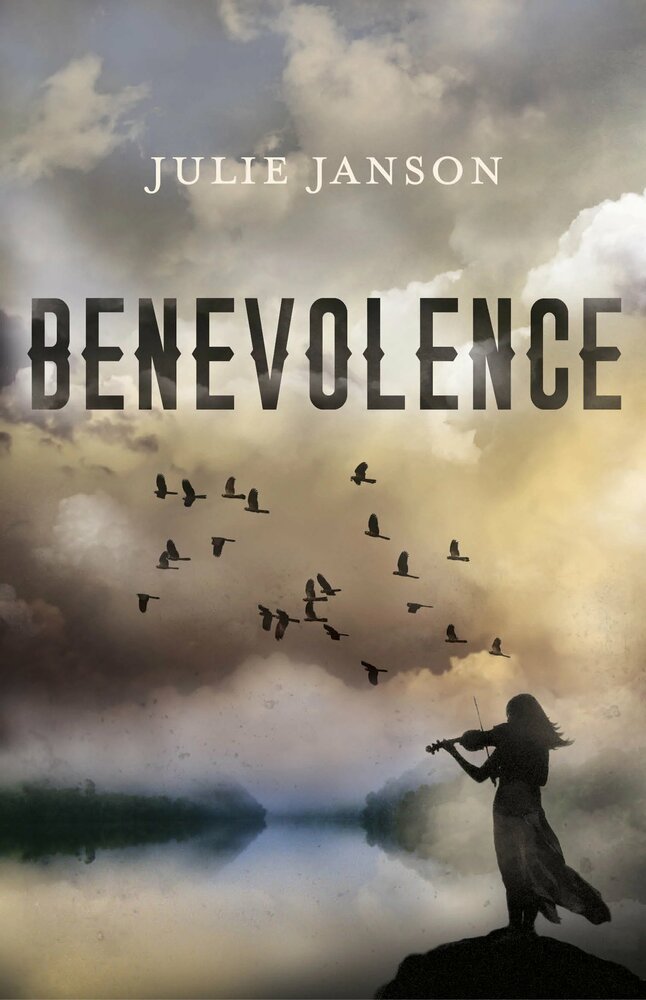 In this triumph of research and imagination set in colonial Western Sydney, Janson introduces the reader to Muraging, a 12-year-old Darug girl handed over by her father to the Parramatta Native Institution. Renamed Mary, the story follows her as she attempts to navigate a life under the most oppressive circumstances, moving between the brutality and relative plenty of colonial life, and the belonging, danger and deprivation of her family and their vanishing traditional lifestyle. Benevolence is both compelling and heartbreaking. Mary is grieving the loss of her family and unable to fit into either culture, and Janson writes her with deep empathy and a sharp intensity. The title, Benevolence, reveals the nuance with which Janson treats the motivations behind the appalling actions of her white characters; their ingrained racism leads some of them to consider themselves genuinely benevolent, while others make no attempt to hide their evil. Mary’s courage, loyalty and intelligence make her an outstanding example of a positive depiction of a woman, and Benevolence is a timely correction that should become an essential part of the Australian historical fiction canon.
In this triumph of research and imagination set in colonial Western Sydney, Janson introduces the reader to Muraging, a 12-year-old Darug girl handed over by her father to the Parramatta Native Institution. Renamed Mary, the story follows her as she attempts to navigate a life under the most oppressive circumstances, moving between the brutality and relative plenty of colonial life, and the belonging, danger and deprivation of her family and their vanishing traditional lifestyle. Benevolence is both compelling and heartbreaking. Mary is grieving the loss of her family and unable to fit into either culture, and Janson writes her with deep empathy and a sharp intensity. The title, Benevolence, reveals the nuance with which Janson treats the motivations behind the appalling actions of her white characters; their ingrained racism leads some of them to consider themselves genuinely benevolent, while others make no attempt to hide their evil. Mary’s courage, loyalty and intelligence make her an outstanding example of a positive depiction of a woman, and Benevolence is a timely correction that should become an essential part of the Australian historical fiction canon.
Revenge: Murder in Three Parts by S.L. Lim (Transit Lounge)
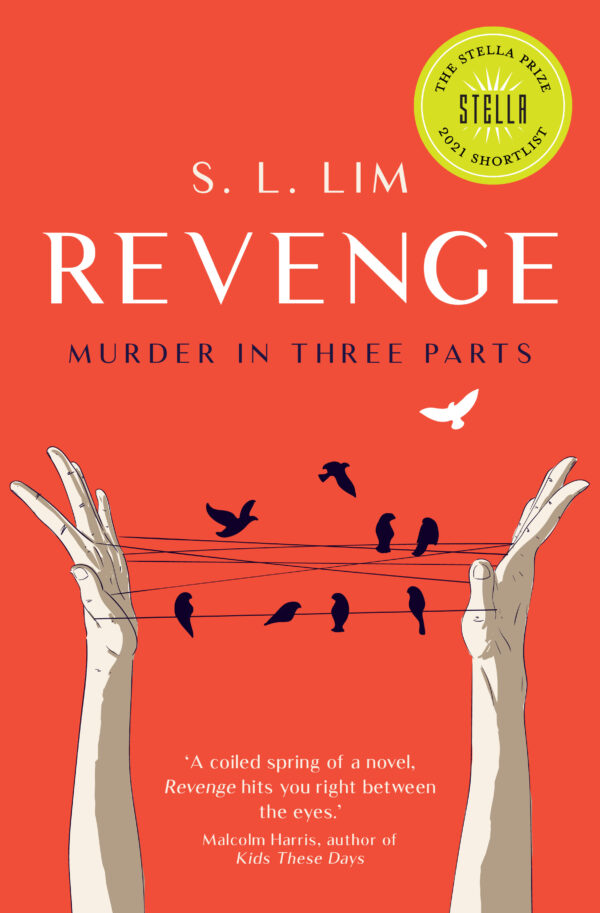 Revenge is a Künstlerroman sans the Künstler: a story of the struggle to live life in a society, and within power structures, that predetermine the kind of life you can lead – a fate from which no amount of talent, power or girlboss energy can possibly rescue you. Lim is the real deal. With style and energy, Lim transports the reader from Malaysia to Sydney and all of the psychic spaces in between, exploring the ‘menial, petty business of survival’ through queer relationships, patriarchy, the physical and emotional labour expected of women, art, capital, and love. Yannie is a protagonist for our times, a primal scream directed toward all that divides us from the world, ‘measured not in what you can give but in what you are willing to give up.’ Not everyone is free to craft their future, but Yannie reminds us that we can fight, we can rage, we can mourn, and we can survive.
Revenge is a Künstlerroman sans the Künstler: a story of the struggle to live life in a society, and within power structures, that predetermine the kind of life you can lead – a fate from which no amount of talent, power or girlboss energy can possibly rescue you. Lim is the real deal. With style and energy, Lim transports the reader from Malaysia to Sydney and all of the psychic spaces in between, exploring the ‘menial, petty business of survival’ through queer relationships, patriarchy, the physical and emotional labour expected of women, art, capital, and love. Yannie is a protagonist for our times, a primal scream directed toward all that divides us from the world, ‘measured not in what you can give but in what you are willing to give up.’ Not everyone is free to craft their future, but Yannie reminds us that we can fight, we can rage, we can mourn, and we can survive.
Smart Ovens for Lonely People by Elizabeth Tan (Brio)
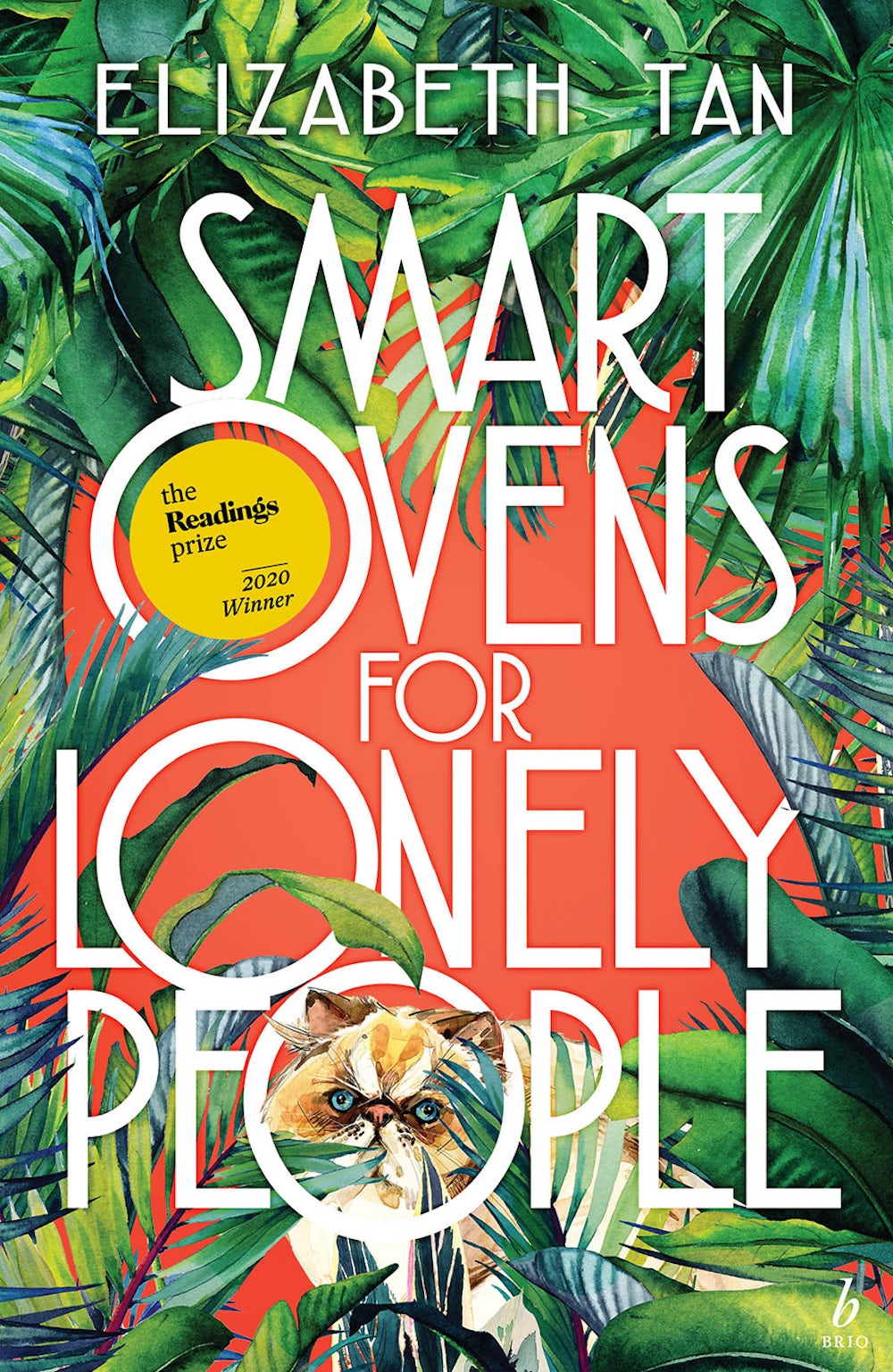 There is a real sense of originality and warmth at play in this, Tan’s second book. Tan proves herself willing to follow a thought to see where it will lead, writing women and girls with heart, humour, and a style so sharp you could hurt someone with it. Whether depicting novelists encountering novels they haven’t written, ovens designed to comfort those struggling with loneliness and suicidal ideation, competitive ASMR tournaments set in a space somewhere between the terrorist theatrics of Glamorama and the cross-country conspiracy theorising of The Crying of Lot 49, or stories that contain, in only eight paragraphs, enough human and romantic engagement to fill two or three Russian novels (take that, Tolstoy!), Tan crafts existentialist parables about the human heart, what it feels like to exist, as young girls and as older women, in the world, the bonds that exist between people, the struggle to find identity, paranoia, and the absurdity of our contemporary moment – a chestnut many have tried to crack, although few have managed to do so as deliciously, and as joyously, as Tan does here.
There is a real sense of originality and warmth at play in this, Tan’s second book. Tan proves herself willing to follow a thought to see where it will lead, writing women and girls with heart, humour, and a style so sharp you could hurt someone with it. Whether depicting novelists encountering novels they haven’t written, ovens designed to comfort those struggling with loneliness and suicidal ideation, competitive ASMR tournaments set in a space somewhere between the terrorist theatrics of Glamorama and the cross-country conspiracy theorising of The Crying of Lot 49, or stories that contain, in only eight paragraphs, enough human and romantic engagement to fill two or three Russian novels (take that, Tolstoy!), Tan crafts existentialist parables about the human heart, what it feels like to exist, as young girls and as older women, in the world, the bonds that exist between people, the struggle to find identity, paranoia, and the absurdity of our contemporary moment – a chestnut many have tried to crack, although few have managed to do so as deliciously, and as joyously, as Tan does here.
The Bass Rock by Evie Wyld (Penguin Random House)
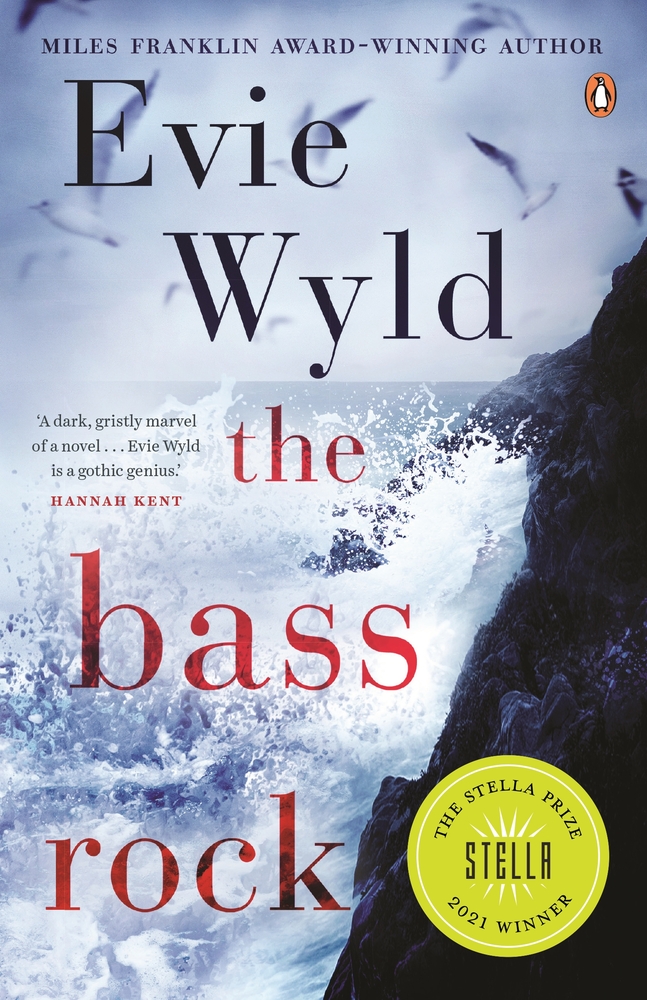 In The Bass Rock, we meet three different women at three different times, linked by the common geographical setting of small-town coastal Scotland. Sarah, in the 1700s, has been accused of witchcraft and is on the run. Ruth, in the 1950s, is trying to mother two stepsons while being gaslit by their father. And Viviane, today, is mourning the death of her father (one of Ruth’s stepsons) and helping with the sale of Ruth’s house. This novel’s scope and complexity of structure is grand and impressive, yet the women’s stories remain readily accessible and enthralling. The Bass Rock is shot through with violence done by men to women, and never shies from confronting the reader with the reality and ubiquity of this. Wyld’s intention is clear, and clearly realised: to shine a light on what is still too often overlooked. The horror of this violence and suffering – an indelible and necessary element – is enmeshed with a wholly humane and at times deliciously funny telling of the lives of Viviane, Ruth and Sarah, resulting in the evocation of a collective experience. There is an unswerving and unashamed rage at the heart of this extraordinary book, which performs a perfect balancing act with the impressive skill of Wyld’s prose.
In The Bass Rock, we meet three different women at three different times, linked by the common geographical setting of small-town coastal Scotland. Sarah, in the 1700s, has been accused of witchcraft and is on the run. Ruth, in the 1950s, is trying to mother two stepsons while being gaslit by their father. And Viviane, today, is mourning the death of her father (one of Ruth’s stepsons) and helping with the sale of Ruth’s house. This novel’s scope and complexity of structure is grand and impressive, yet the women’s stories remain readily accessible and enthralling. The Bass Rock is shot through with violence done by men to women, and never shies from confronting the reader with the reality and ubiquity of this. Wyld’s intention is clear, and clearly realised: to shine a light on what is still too often overlooked. The horror of this violence and suffering – an indelible and necessary element – is enmeshed with a wholly humane and at times deliciously funny telling of the lives of Viviane, Ruth and Sarah, resulting in the evocation of a collective experience. There is an unswerving and unashamed rage at the heart of this extraordinary book, which performs a perfect balancing act with the impressive skill of Wyld’s prose.
The Barbara Jefferis Award celebrates women in literature and is awarded biennially for “the best novel written by an Australian author that depicts women and girls in a positive way or otherwise empowers the status of women and girls in society”.
The Award is named for highly regarded author Barbara Jefferis, a founding member and executive director of the Australian Society of Authors. It is supported by the Barbara Jefferis Literary Fund, which was established as a result of a bequest from Barbara Jefferis’ husband, ABC film critic John Hinde, who died in 2006. The Australian Society of Authors is the Trustee of the Fund.
The winner will receive a prize of $50,000, with $5,000 to be distributed among the shortlist.
The winner of the 2020 Barbara Jefferis Award was Lucy Treloar for Wolfe Island.
For more information about the Barbara Jefferis Award, visit: https://www.asauthors.org/services/barbara-jefferis-award
Keep up-to-date with ASA advocacy, support and advice
with our fortnightly newsletter.